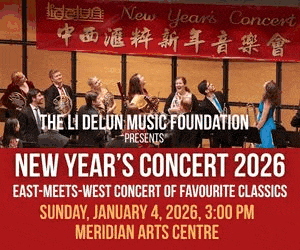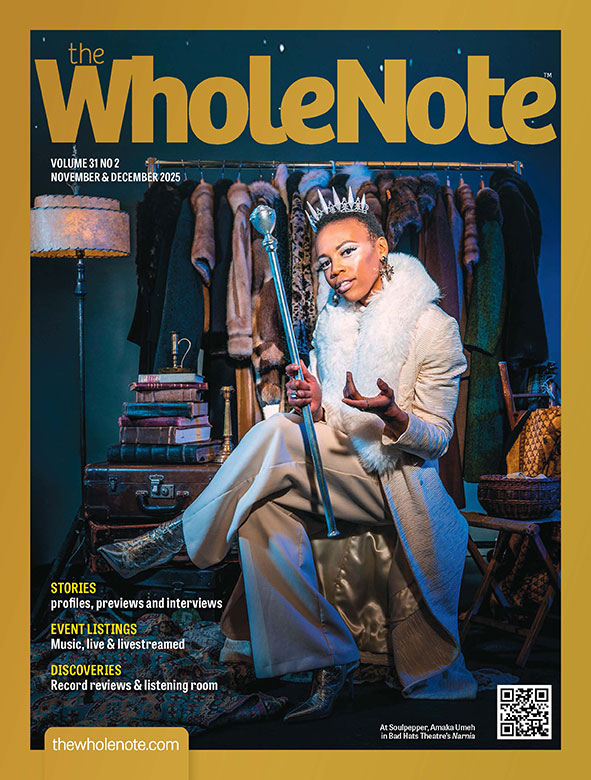AS FAR AS I CAN RECALL this is the first WholeNote cover (of 157) that does not directly reference an event in our live performance listings (although you will find it referenced in our admirable and burgeoning ETCeteras on page 56). Mulroney: The Opera may well be operatic, but it is not an opera in the traditional sense. It’s not even a filmed opera in the way that Live from the Met in HD is these days. The people we see singing in it are not actually singing, for one thing. And, unless some notable operatic man about town finds a way of rebuilding it, as some form of opera in concert, say, in a tennis stadium, it’s won’t likely see the operatic light of day.
Indeed some who go and see it will come away saying “Calling it an opera doesn’t make it an opera any more than calling an airline Jazz really makes it fly.” But some will say “Yes indeed!” It doesn’t have to be live to be alive.
A different example: in the little village I find myself in, right now, seven time zones and 8000 miles away from Toronto, there are about forty or fifty families that are permanent residents (among the 240 to 300 holiday homes). And every month (133 times so far) they get together, of a twilight, in one or another of their homes, to listen to about an hour of recorded music – anything the hosts want to play, along with, if they like, a few interpolated words as to why.
Different people have been the glue that has held this little club together at different times. After all, people come and go. From gathering 100 to 132 it was my mom, and especially my dad’s, turn: convening, planning, collecting the programs on slowly yellowing paper in carefully updated binders. And every January they hosted one of the gatherings, always right around their birthdays.
It was around November last that dad started to put all his failing energy into this January’s meeting of the Nature’s Valley Music Club. With the help of my sister who searched the CDs and copied tracks and typed, they got it together. The event had to be held at someone else’s home. And he couldn’t be there. But the Club all got to hear the chosen music, and through my sister’s lips, why it had been chosen.
First came a little set (Barber’s Agnus Dei; Palestrina’s Kyrie; Mozart’s Ave Verum corpus, Faure’s In Paradisum and Schubert’s Heilig ist der Herr), sung by the Choir of New College, Oxford. Then came a boisterous “I Vow to Thee My Country” by the National Symphony Orchestra. And then selections by Salamone Rossi, performed by the King’s Singers and Sarband, because “they give an example of how psalms can be a source of spirituality, a political instrument, a link between tradition and modernity, and above all a bridge connecting human beings.”
His two favourite Schubert Impromptus (C minor and G Flat major), followed that, and then two more short pieces in Hebrew by Salamone Rossi, as voiced by Boston Camerata and Joel Cohen. “I will sing unto my God, my rock and my redeemer, songs of rejoicing and of praise, of joy and gladness … in the heart of the community.” And “Let me open my lips and give utterance to song. Yea I will sing to the Living God.”
And last, from Music for a May Morning, sung by the Choir of Magdalen Choir, Oxford, “When Evening’s Twilight” by John Hatton, because it was a “madrigal of pastoral love – how the beauty of nature reminds you of someone you love.”
From January 21 to March 9 this “little tape,” as out of habit he’d have called the CD, played over and over at his bedside, in his home. Now as I write it is playing for me. And I offer it, if only in words to you.
Sometimes music doesn’t have to be live to be alive.




